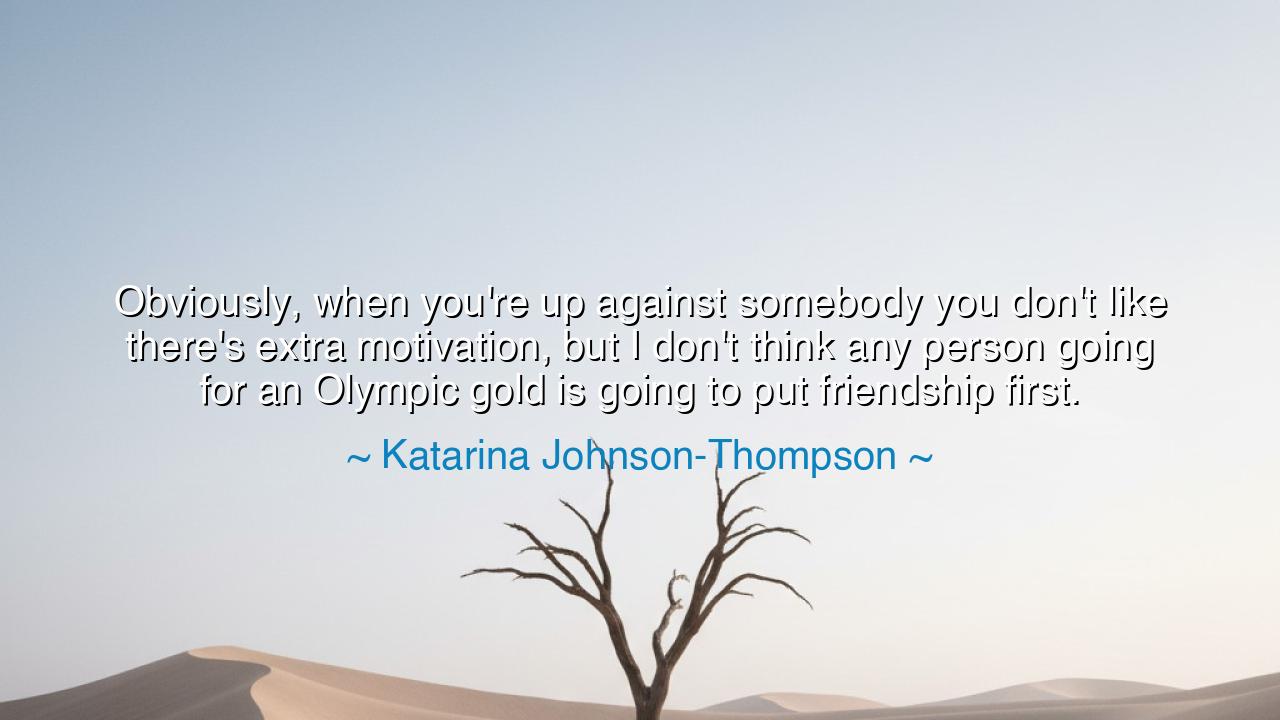
Obviously, when you're up against somebody you don't like there's
Obviously, when you're up against somebody you don't like there's extra motivation, but I don't think any person going for an Olympic gold is going to put friendship first.






In the words of Katarina Johnson-Thompson, the Olympic heptathlete, we hear the unflinching honesty of a warrior’s heart: “Obviously, when you're up against somebody you don't like there's extra motivation, but I don't think any person going for an Olympic gold is going to put friendship first.” These are not words of cruelty, but of clarity. They echo the eternal truth that the path to greatness demands focus, sacrifice, and the silencing of sentiment. In the crucible of competition, even friendship becomes secondary to the call of destiny. It is not hatred that drives her—it is the sacred fire of purpose.
The origin of this quote arises from the brutal arena of elite sport, where the margin between victory and defeat is the width of a breath. Katarina Johnson-Thompson, known for her resilience and resurgence after injury and disappointment, has lived within that narrow space where emotion must yield to discipline. Her words reflect the ancient athlete’s creed: that to reach the summit, one must sometimes walk alone. Even in modern times, the Olympic field remains a battlefield of the spirit—where camaraderie may warm the heart, but ambition must command the soul.
This truth is not confined to sport. In every age, those who seek the highest peaks have wrestled with the same dilemma. Alexander the Great loved Hephaestion as his brother, yet when strategy called, he set aside affection to win empires. Marie Curie, while surrounded by peers, toiled in isolation, placing discovery above social ease. The heroic path often demands that we set aside comfort for calling. It is not friendship that is denied—but rather postponed, transformed, or subordinated to a greater purpose. The warrior’s heart beats not with malice, but with unyielding devotion to the dream that defines it.
To not put friendship first does not mean to scorn it; it means to know the order of things. There is a time for fellowship and a time for the solitary ascent. During the race, the mountain, the trial, the artist or athlete must stand alone. The bow must be drawn tight; the heart must narrow its aim until only the goal remains. Yet, when the contest is over, when the laurel is won or lost, the victor may turn again to friendship—this time with deeper understanding, forged in fire, purified of dependence. For only those who have known solitude can truly honor companionship.
There is also a spiritual lesson hidden in her words. The great contest of life is not always against others—it is against one’s own weakness, fear, and distraction. The “somebody you don’t like” may, in truth, be your own shadow, your own doubt. And so, when she says that no one aiming for gold puts friendship first, she speaks to the necessity of inner conflict—the willingness to challenge comfort, to confront the self with ruthless honesty. Victory, in this light, is less about medals and more about mastery of the spirit.
The history of Jesse Owens offers a profound echo. In the 1936 Olympics, Owens faced the hostility of Nazi Germany and the expectation of his nation. His greatest rival, the German long jumper Luz Long, offered him advice mid-competition—a gesture of sportsmanship that defied politics. Owens went on to win gold, but it was Long’s act of courage that made the friendship between them immortal. Here we see both sides of Johnson-Thompson’s truth: the competitor’s focus and the human heart that still beats beneath it. Friendship may not come first in the moment of striving, but it survives afterward as the soul’s quiet reward.
The lesson, then, is one of balance and sacred discipline. In pursuit of excellence, know when to steel your heart and when to open it. During the climb, let nothing distract you; after the summit, remember those who stood beside you on the lower slopes. Practical wisdom calls for discernment: guard your focus, honor your rivals, and recognize that the fiercest competitions often create the deepest respect. In the end, as Johnson-Thompson’s words remind us, greatness is born not from hostility, but from the strength to choose purpose over comfort—and to return, victorious, with grace.






AAdministratorAdministrator
Welcome, honored guests. Please leave a comment, we will respond soon